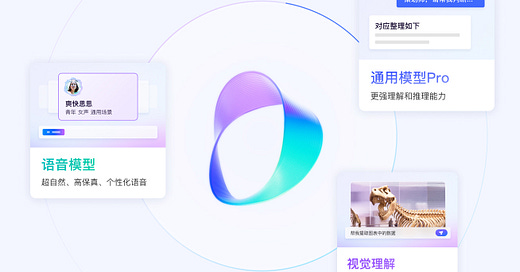ByteDance's AI Surge: Introducing the Doubao Model Family
In the ever-evolving field of artificial intelligence, ByteDance has taken a significant leap forward with its recent announcements at the annual "Force Conference." This event showcased ByteDance's commitment to advancing AI, unveiling a series of updates from foundational models to top-layer applications under its subsidiary, Volcano Engine.
Unified Branding and New Releases
One of the most notable changes is the rebranding of ByteDance's AI models. The previously known "Lark" models are now unified under the "Doubao Model Family" name.
This family includes nine models, streamlined into two primary categories: general-purpose models and seven specialized models tailored for various functions, including role-playing, speech recognition, speech synthesis, voice cloning, and text-to-image generation.
The Doubao general-purpose models are available in two versions: Pro and Lite, catering to different user needs. This approach contrasts with competitors' broad, all-encompassing models, highlighting Doubao's more focused strategy.
Impressive Performance Metrics
In terms of performance, Doubao models are impressive, according to data shared at the conference.
Currently, these models process an average of 120 billion tokens of text and generate 30 million images daily.
The Doubao App, a major AI application built on these models, leads the domestic AI-generated content (AIGC) market, topping download charts on both the Apple App Store and major Android platforms in China.
According to Zhu Jun, ByteDance's Vice President of Products and Strategy, the app has seen the creation of over 8 million intelligent entities and boasts 26 million monthly active users.
Competitive Pricing Strategy
Volcano Engine also announced a groundbreaking pricing strategy, setting the cost at 0.0008 yuan per thousand tokens. This is significantly lower than competitors, such as OpenAI's GPT-4o, which charges approximately 0.035 yuan per thousand tokens for input and 0.1 yuan per thousand tokens for output.
In comparison, domestic large model providers average around 0.12 yuan per thousand tokens.
This substantial price reduction is attributed to several factors, including optimization in model structure and the adoption of distributed inference methods, which enhance computing efficiency.
Volcano Engine's head, Tan Dai, emphasized that this pricing strategy is not intended as a price war but follows a sustainable business logic aimed at fostering long-term commercial cooperation.
Keep reading with a 7-day free trial
Subscribe to China Innovation Watch to keep reading this post and get 7 days of free access to the full post archives.



